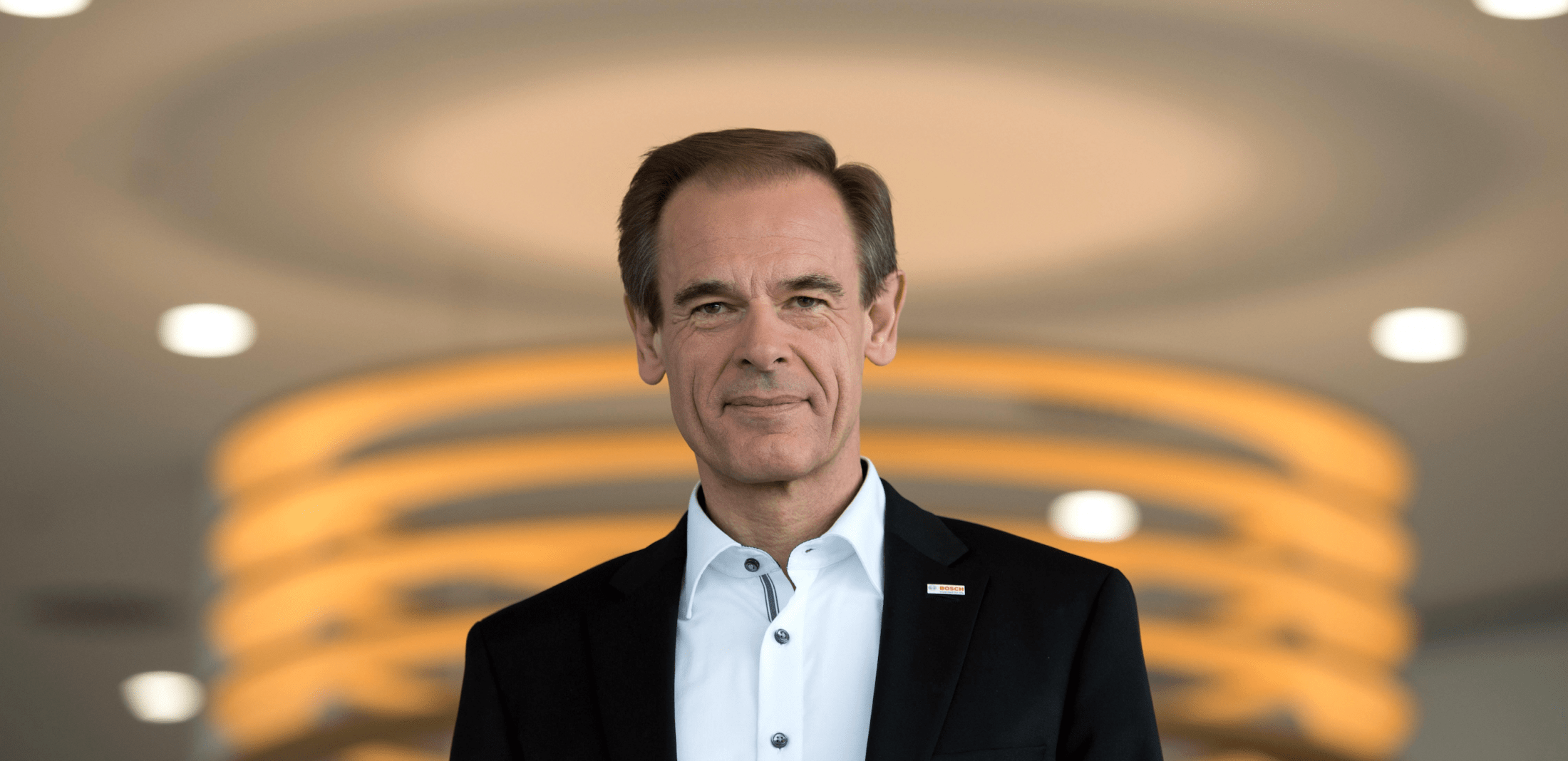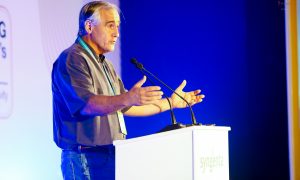He may have one eye on life post-Bosch following a management shuffle set to take effect at the end of the year, but the company’s long-serving – and outspoken – CEO is committed as ever to revolutionising transport.
It’s been an eventful year for Volkmar Denner, the outgoing CEO of Germany’s Robert Bosch GmbH; in June the multinational engineering and technology company announced that he’s stepping down at the end of 2021 after almost a decade in charge, while he’s also made the headlines for slamming the European Union’s “fixation on electric vehicles (EVs).”
We want our customers to be enthused by our products and in this way help make our world a little better with technology that is invented for life
Bosch said the shift is “part of a generational change” planned well in advance which will also see Chairman Franz Fehrenbach retire at the same time to be replaced by CFO Stefan Hartung. Volkmar’s imminent departure comes despite the company recording strong sales in 2020 totalling $85.4 billion.
Bosch – Europe’s largest car parts supplier – and the EU haven’t seen eye to eye of late regarding EVs. Volkmar in particular has taken aim at the bloc and slammed mooted measures that are predicted to wipe out the internal combustion engine; he’s accused the EU of “having a short-sighted objective when it comes to EVs.” He has also questioned why more isn’t being done to look into hydrogen and renewable fuels, saying “climate action is not about the end of the internal combustion engine, it’s about the end of fossil fuels. And while electro mobility and green charging power make road transport carbon neutral, so do renewable fuels.”
Volkmar’s comments arrive at a pivotal time for the automotive industry, with many carmakers recently committing to a large-scale shift to EV production. Volkswagen, for example, has decided to discontinue investment in hydrogen technology, with VW’s top brass being absolutely clear that the company sees EVs as the future. The likes of Volvo and Jaguar have also said they’re jumping on the EV bandwagon in the near future.
These moves come amid a growing chorus in favour of the EU implementing new “Euro 7” rules on carbon dioxide and nitrogen restrictions, which many say could spell the end for the internal combustion engine.
Despite this, and the fact he’s on his way out, Volkmar remains committed to driving innovation and making sure Bosch continues to make “smart moves.”
“Bosch has always been associated with progress,” he says. “We want our customers to be enthused by our products and in this way help make our world a little better with technology that is invented for life. So how do we do this? How do we create innovative and truly beneficial solutions? It takes bright ideas, bold decisions, and smart moves. In fact Bosch’s story starts with a smart move over 130 years ago when Robert Bosch set up a workshop for electrical engineering at a time when this branch of technology was still in its infancy. Today we would say he was quick to realise the potential of disruptive technologies and established a startup. As we see it, making smart moves in our customers’ interests is about one thing in particular – giving them connectivity. More than 60% of our new product classes are now WAP-enabled.”
Developing artificial intelligence (AI) is one of Volkmar’s priorities and Bosch is a pioneer in creating technology to help vehicles drive automatically.
“We were quicker than many others to see connectivity and the Internet of Things (IoT) as an opportunity and springboard for improving our products, and Bosch will continue on this path. This is why we believe AI offers such huge potential for innovations, such as Bosch’s multi-purpose cameras. Combining image processing algorithms with AI brings us a significant step closer to automated driving. Our cameras enable vehicles to see pedestrians and more importantly to predict what they will do next. If a camera determines that someone is about to step out into the road, the car will brake automatically. By 2025, we want every Bosch product to be like this camera; either to utilise AI itself, or to have been developed or manufactured with its help. We see this as our next smart move – with the help of AI we are turning out products into smart assistance.”
The future of mobility is “emissions-free, accident-free, and very exciting
Volkmar has also given his two cents on the COVID crisis and is pushing for both a more effective global vaccination strategy and for big companies to be involved. He says it’s impossible to defeat the pandemic without “making a few mistakes” along the way, and wants to see more pragmatism – especially in his home nation Germany – where he argues that “everyone who can vaccinate should be allowed to vaccinate.” Bosch’s CEO says the company doctors “are ready to help vaccinate on a large scale” without “unnecessary formalities.” He adds that Bosch “knows its employees and always looks after them personally.” This is no small task given the company has more than 400,000 associates on its books, all of whom are regularly tested for COVID using a self-developed rapid PCR test system in more than 50 locations. Volkmar warns that while these tests are helpful it’s imperative for the company to enforce other protective measures. “The balance is tricky because we all naturally want a normal life,” he explains. “We are following the race between the vaccination progress and the spread of mutations with concern.”
Despite the fact he’s departing Bosch in a few months, Volkmar is working hard to make sure its future plans to revolutionise transport become a reality. He says that according to the company’s strategy, the future of mobility is “emissions-free, accident-free, and very exciting.” The CEO argues, though, that “regulation has to be set in a way that ensures technical progress can be fostered to address the needs of societies and also our environment.”
Climate change remains one of the most important areas that Bosch is working to address, and the company became CO2 neutral last year throughout all of its locations, which required massive investment. Volkmar is adamant that “a fundamental change of the current legislation” affecting the automotive industry is required “to be able to assess the different technical solutions with respect to their climate impact”
It remains to be seen where Volkmar will ply his trade next in 2022, but it’s a pretty safe bet he’ll remain as outspoken as ever.
Read and download the full article here.









